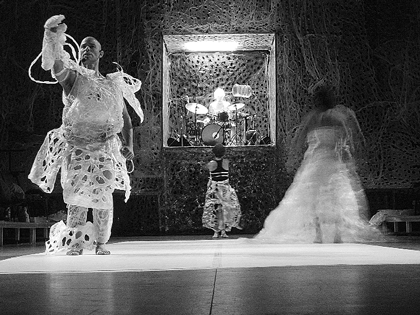Multimedia “5 Streams” re-examines classic South Asian texts
The ancients associated challenge, conflict, and change with the number five. Five knocks the thick table legs out from under the number four, upsets the apple cart of stasis, and makes way for the temporary glories of the Golden Age of Six.
How fitting then that conceptual artist, director, and choreographer Ibrahim Quraishi named his newest work “5 Streams.” This multimedia installation dwells in five-ness, right where its creator feels most at home. Like the Bhagavad-Gita’s warrior prince Arjuna––a touchstone for this operatic narrative—Quraishi drove his work, his chariot, between opposing armies in a space charged with tension and foreboding.
In its world premiere at Asia Society, “5 Streams” occupied a relatively narrow strip of floor separating two long rows of audience seating. Imagine the audacity of the original Arjuna opening sacred space between armies––all his kin and teachers, poised for battle––where he might attend the counsel of the divine. Imagine the massive pressure threatening that space, the inexorable passage of real-world time threatening to rend that dream of timelessness. Occasionally Quraishi’s over-the-top visions achieved this dangerous electricity; often they fell considerably short.
“5 Streams” takes inspiration from the five prime Hindu and Islamic nations of South Asia––India, Pakistan, Bangladesh, Nepal, and Sri Lanka—five rivers of the region, five pillars of Islam, and five protagonists of the Mahabharata.
In addition to the Bhagavad-Gita, Quraishi takes as points of departure two other literary texts––”Who Knoweth Himself” by Islamic mystic Ibn Al-Arabi (1165-1240) and “Anarkali,” a court romance from Mughal India. The operative word here though is “departure,” since Quraishi never swears loyalty to the letter of any text he appropriates.
The evening opens with a lengthy, finely wrought Kathak solo by and for the exquisite Parul Shah, set against a video projection by Marc Perroud, a.k.a. tzid. The performer, her body draped in a royal purple veil, slapped flatfooted, rhythmic steps against what appeared to be a great, cascading stream of water. Impressionistic video images of nature and urbanscapes also slid beneath her feet––all suggesting the futility of grasping at certainty and safety. Shah carried the entire section; two “voice/movement” performers standing atop scaffolds on either side of the space seemed minimally involved.
Indeed, for all its visual and aural largesse, “5 Streams” only roared to life whenever Arthur Aviles (Krishna) and Subarna Kumar Thapa (Arjuna) claimed their space and our attention. Without these two, there was no party. Their superheroic vibrancy both terrified and thrilled. Moving and speaking, bristling with ego and erotic energy, they were the white heat at the core of Quraishi’s fever dream, born to wear their completely outlandish, awkward armor of clear plastic illuminated from within by tiny dots of white and blue light. The stiff, ice-like “fabric” looked as if a big cat had heartily chewed it up and spit it out––and I mean that as an awe-filled compliment to designer Xavier Hool.
In one indelible scene, Thapa sat in supplication while Aviles perched atop him, hunched forward and gripping his thighs with clawlike toes. Ages seemed to pass as the motionless Krishna––a Symbolist, sci-fi chimera––held his human student in thrall. Little in the work’s entire 90 minutes worked as effectively as this or any of the other encounters between these two exceptional players.
“5 Streams” ends with the illusion that it’s never ending. For Quraishi, the classic texts he loves and deconstructs are alive and always breathing; the streams, always flowing. Suddenly, a performer motioned to us to rise and depart although she continued to move and sing. We obediently filed out through a “forest” of thin, brown plastic constructions hanging from ceiling to floor. Some of them emitted music; none bore leaves. I’d be hard-pressed to say which looked more dispirited––these denuded “trees” or my fellow audience members. Great crisis still afoot it seemed, but no great armies in evidence.
gaycitynews.com



































